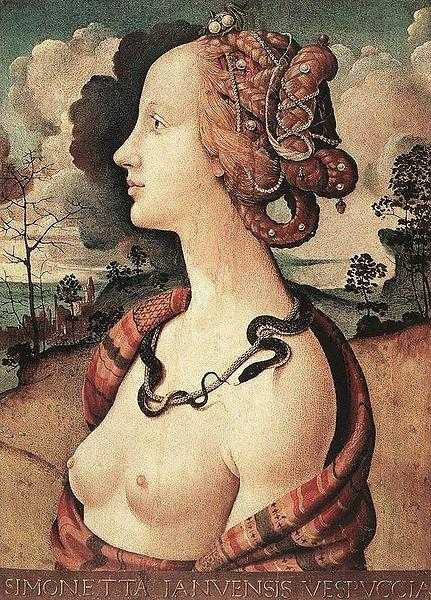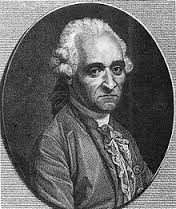Antoine Fabre d'Olivet
Antoine Fabre d' Olivet ( born December 8, 1768 in Ganges (Hérault ), † March 27, 1825 in Paris) was a French writer, historian, philologist, theosophist and Illuminist.
Life and work
Fabre d' Olivet (born Antoine Fabre ) was born in 1768 as the son of a middle-class Protestant Huguenot family. Later he added his own name to his mother ( d' Olivet de Sauves ) the family nickname.
He was a self-taught, was during the French Revolution at the Jacobin Club, and wrote patriotic plays, with whom he had some success.
1801 published his Lettres à Sophie sur l' histoire (1801 ), an overview of old and new systems of cosmogony and a history of civilizations. In this publication the following years, he was going through a life crisis in which he came to believe that the various cosmogonic systems underlies the old adage teaching, which had been founded in ancient Egypt and passed by both insiders as Moses, Pythagoras and Orpheus.
In 1805 he married Marie Varin, who participated later as a medium with his hypnotic experiments and séances. Inspired Duch, the visions of his wife, he created a doctrine that influenced the younger Martinist.
Fabre d' Olivet Later developed esoteric beliefs, which are of Theosophy attributed (in the sense of Jakob Böhme ) and the Illuminism. In 1811 he published a report stating that he had cured by " magnetization" of a deaf-mute ( Notions sur le sens de l' ouïe ). He had applied knowledge which he had acquired by a new translation of Genesis moseschen. With Les verse dorés de Pythagore he put 1813 a new translation of the Golden Verses of Pythagoras before, the introduction to which he tried to show by comparison with other ancient and Indian, Chinese and Persian texts and writings of modern philosophers, that these are all the "truths " the original ancient Egyptian revelation contained. By 1816, followed by the earlier -mentioned translation of the Pentateuch (La Langue hébraïque restituée ) with a comment, Fabre d' Olivet in explaining that even Moses was an initiate, but that the deep wisdom contained in his writings had become inaccessible because the necessary knowledge of the esoteric meanings of Hebrew had been lost. He, Fabre d' Olivet, have rediscovered these hidden meanings and restored the original Theosophical cosmogony of Moses.
De l'Etat de l' homme social (1822 ) was a representation of the history of mankind on the basis of the developed in his earlier works cosmogony. In the introduction to the 1824 edition published (with the new title Histoire Philosophique du genre humain ) Fabre d' Olivet explained that the conventional historiography is flawed, because they do not know the true principles that govern the cosmos and history. To understand the story correctly, one must above recognizing the spiritual nature of humanity and its place in the hierarchy of the universe.
Fabre d' Olivet in 1823 brought an annotated translation of Lord Byron's drama Cain out. In his commentary, he led again from its cosmogony and its Illuminist interpretation of Genesis.
With a few followers, he founded in 1824 a lodge called Théodoxie Universal modeled after the Masons, in which, however, the Masonic symbols were replaced by those from agriculture. The well-kept in this box doctrines he laid down in writing; they were not published until 1953 under the title La Vraie Maçonnerie et la Culture Céleste.
Epistemology
Fabre d' Olivet drew on Immanuel Kant and thought he could overcome its epistemological pessimism. His argument in this regard was based on the assumption that man is composed of body, soul and spirit exists and that the spirit of the soul is superior. Kant did not recognize the spiritual faculties of the human mind and was therefore erroneously come to the conclusion that one can know nothing of spiritual "truths". Fabre d' Olivet postulated contrast, the ability of the human mind to intuitively grasp the ontological Absolute.
Reception
A greater importance was Fabre d' Olivet work only in the decades after his death. In the 1830s and 1840s, he found wide recognition among illuminists. He also influenced socio- religious theorist of Romanticism as Pierre- Simon and Pierre Leroux Ballanche. The highlight of his action, he reached in the epoch of symbolism. His Histoire Philosophique du genre humain was well received by occultists at the end of the 19th century, and the idea developed in successive human "races" built Helena Petrovna Blavatsky from their " root races " doctrine.
Works
- Azalais et le gentil Aimar - Histoire Provencale, traduite d'un ancien manuscrit Provencal, 3 vols, Paris 1798-1799
- Le Troubadour, poésies occitaniques, 1803 edition Lacour, Nîmes 1997
- Notions sur le sens de l' ouïe en général, et en particulier sur la guérison de Rodolphe Grivel, sourd - muet de naissance en une série de lettres écrites par Fabre d' Olivet, 1811 (online)
- Les verse dorés de Pythagore, expliqués et pour la première fois traduits en vers français eumolpiques, Precedes d'un Discours sur l' essence et la forme de la poésie, chez les principaux peuples de la terre, 1813, edition of L' Âge d' homme, Lausanne, 1991 ( online)
- La langue hébraïque restituée, Paris 1816, facsimile at Raymond Fawer SA, Collection Delphica, Renes, Switzerland 1975
- De l' état de l' homme social, ou Vues sur l' histoire du philosophiques genre humain, 2 volumes, 1822 ( Online Band 1, Band 2)
- Caïn, en trois actes mystère dramatique de lord Byron, traduit en vers français et Refute dans une suite de remarques philosophiques et critiques, 1823, edition Slatkine, Geneva 1981
- Histoire Philosophique du genre humain (2 vol ), Paris 1824
Posthumously:
- Mes souvenirs, Boumendil, Nice 1977
- Fabre d' Olivet Miscellanea, 2 volumes, Boumendil, Nice 1978 and 1982
- La Langue d'oc rétablie. Grammaire, ed. by Georg Kremnitz, Braumüller, Vienna 1988
- La Langue d' Oc rétablie dans ses principes, Steinfeld, Ganges 1989










